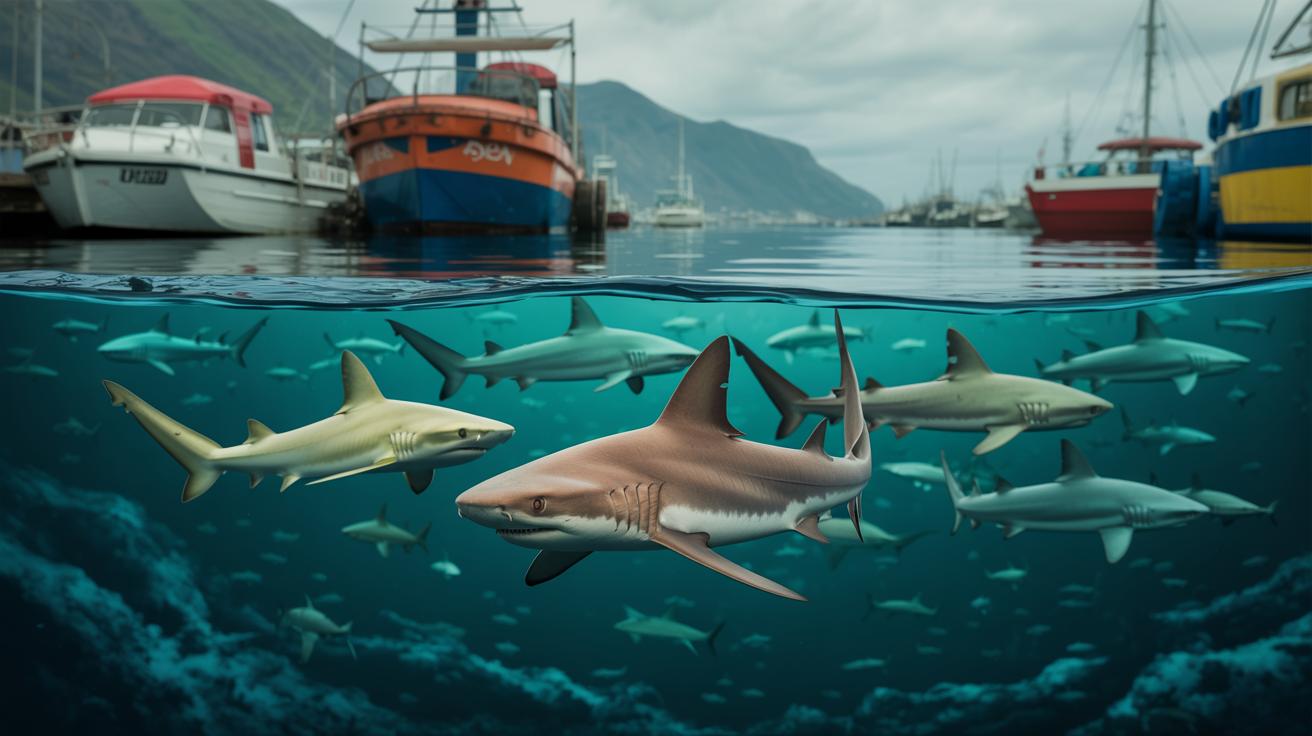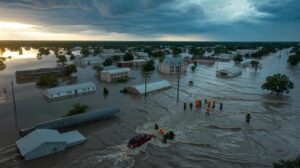What You Need to Know
- 🦈 “Cocaine sharks” found in Brazilian waters are small sharpnose sharks exposed to narcotics, creating a unique environmental challenge.
- 📊 Research reveals that cocaine concentrations in these waters are comparable to caffeine levels, affecting marine life significantly.
- 🔬 Scientists from the Oswaldo Cruz Institute are studying the impact of pharmaceutical pollution on these sharks using advanced techniques like chromatography.
- 🌊 The presence of cocaine in the ocean is part of a broader issue of pharmaceutical pollution affecting ecosystems worldwide.
- 🚨 Addressing this crisis requires enhanced monitoring, stricter regulations, and public awareness to protect vulnerable marine species.
In the coastal waters of Brazil, an unexpected and startling phenomenon is unfolding: the emergence of “cocaine sharks.” These petite Brazilian sharpnose sharks have been found cruising through the drug-laden surf, unwittingly absorbing cocaine from their environment. This peculiar scenario is more than just a bizarre headline; it highlights a significant environmental issue that ties together drug trafficking, marine ecology, and human impact on natural ecosystems. As these sharks navigate waters near bustling ports and popular beaches, they become unintended victims of a much larger story involving pharmaceutical pollution and its ripple effects on marine life.
The Unseen Menace: Cocaine in Our Oceans
While the notion of sharks on cocaine might sound like a plot from a thriller, it is grounded in a stark reality. Coastal waters in Brazil, especially near the Port of Santos, have become unwitting recipients of cocaine. This isn’t due to direct dumping but rather the result of complex drug trafficking routes. Cocaine concentrations in these waters have been found at levels comparable to caffeine, a testament to how pervasive the issue has become. Water currents and tidal movements disperse these substances across vast areas, impacting marine life in subtle yet profound ways. Sharks, particularly the young and agile Brazilian sharpnose, are among the most affected species, as they absorb these chemicals both directly from the water and indirectly through their prey.
The implications of this are vast. As cocaine enters the marine food web, it not only affects individual species but also disrupts the delicate balance of ecosystems. Predators that rely on smaller fish and crustaceans ingest these drugs, leading to potential bioaccumulation and biomagnification. This phenomenon raises critical questions about the long-term health of marine populations and the cascading effects on biodiversity.
Toxicologists at the Helm: The Role of Research
Researchers like Gabriel de Farias Araujo and Enrico Mendes Saggioro from Brazil’s Oswaldo Cruz Institute are at the forefront of studying these “cocaine sharks.” Their work involves collecting and analyzing tissue samples from these sharks, revealing cocaine levels that far surpass those found in other aquatic organisms. By employing techniques like chromatography, they can detect both cocaine and its metabolite, benzoylecgonine, in shark tissues.
This research is crucial for understanding the impact of pharmaceutical pollution on marine life. Sharks, unlike other marine creatures, are apex predators, and any disruption in their physiology can have far-reaching consequences. The researchers’ findings suggest that chronic exposure to cocaine could impair sharks’ natural behaviors, potentially affecting their ability to hunt and evade predators. Such impairments could lead to declines in shark populations, which are already threatened by overfishing and habitat loss.
Pharmaceutical Pollution: A Global Concern
The presence of cocaine in Brazilian waters is a symptom of a broader issue: pharmaceutical pollution. Around the world, drugs enter waterways through various channels, including wastewater discharge and illegal dumping. In Brazil, the situation is exacerbated by its status as a major transit hub for cocaine. Wastewater treatment plants often fail to filter out these substances, allowing them to flow into rivers and estuaries.
| Source of Pollution | Impact on Marine Life |
|---|---|
| Wastewater Discharge | Introduces pharmaceuticals into aquatic ecosystems |
| Illegal Dumping | Directly contaminates water sources |
| Drug Trafficking | Unintended release of narcotics into the environment |
Pharmaceuticals, including cocaine, are not selective in their effects. They alter the behavior and physiology of a wide range of marine species, from plankton to apex predators. The accumulation of these substances in the food chain poses a serious threat to marine biodiversity. As marine life absorbs these contaminants, ecosystems may experience shifts in predator-prey dynamics, reproductive cycles, and migration patterns. This underscores the need for global cooperation in addressing pharmaceutical pollution and safeguarding marine environments.
Taking Action: Mitigating the Impact
Addressing the issue of cocaine sharks requires a multifaceted approach. Enhanced monitoring of water quality, stricter regulations on wastewater treatment, and efforts to curb illegal dumping are essential steps. Researchers advocate for the use of advanced filtration technologies, such as activated carbon filters, to capture narcotics before they enter the open ocean. Environmental DNA surveys can also help identify pollution hotspots, enabling targeted interventions.
Public awareness and education are equally important. By understanding the interconnectedness of human activities and marine ecosystems, individuals and communities can take action to reduce their environmental footprint. Collaborative efforts involving scientists, policymakers, and citizens are vital for protecting vulnerable species and preserving the health of our oceans.
As we navigate these challenges, we must ask ourselves: How can we balance human progress with the preservation of our natural world? The presence of cocaine in sharks is a stark reminder of the unintended consequences of our actions. It prompts us to consider how we can work together to create a sustainable future for our planet and its diverse inhabitants. What role will you play in this global effort?
Did you like it?4.6/5 (29)







11 comments
wesleysapphire
Is there any international cooperation to tackle pharmaceutical pollution globally?
genesis
How does cocaine affect the behavior of these sharks? I can’t even imagine!
AubreyLuminous
Wow! Cocaine sharks? What’s next, dolphins on ecstasy? 😅
Cleo
Thank you for highlighting this crisis. I hope more people will take it seriously.
RoseLabyrinth
How long has this been going on, and why are we only hearing about it now?
jayden
Is anyone working on developing better filtration systems to prevent this kind of pollution?
aiden9
The idea of “cocaine sharks” sounds like a bizarre movie plot! But seriously, this is quite concerning.
coltonmonolith
Is there any chance these sharks could become aggressive? 🤔
Gizmo
Are there any other marine animals affected by this, or is it just the sharks?
LucasLuminescence
Thanks for sharing this, it’s a wake-up call for sure. How can ordinary people help address this issue? 🌊
CharlotteMystic
Wow, this is quite a shocking revelation! How did the cocaine end up in the ocean in the first place?